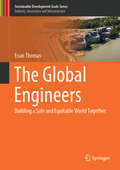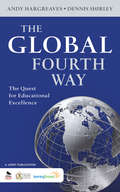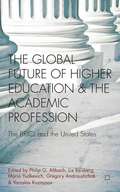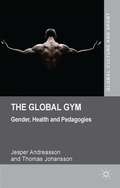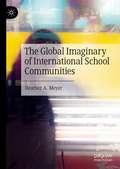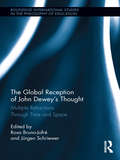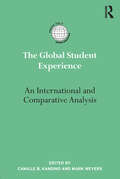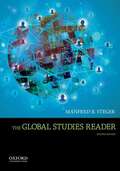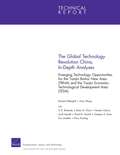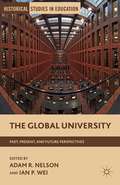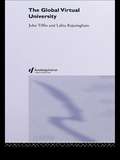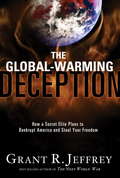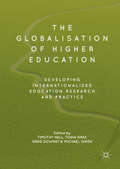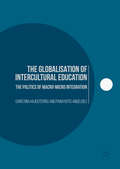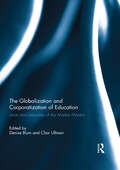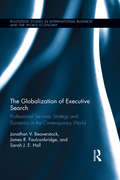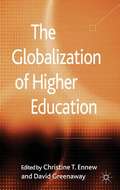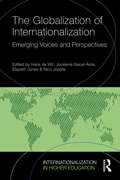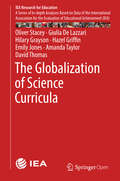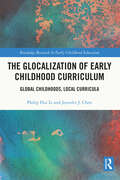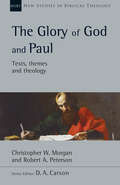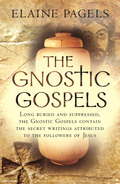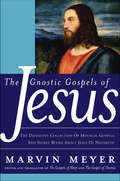- Table View
- List View
The Global Engineers: Building a Safe and Equitable World Together (Sustainable Development Goals Series)
by Evan ThomasThe Global Engineers: Building a Safe and Equitable World Together, is inspired by the opportunities for engineers to contribute to global prosperity. This book presents a vision for Global Engineering, and identifies that engineers should be concerned with the unequal and unjust distribution of access to basic services, such as water, sanitation, energy, food, transportation, and shelter. As engineers, we should place an emphasis on identifying the drivers, determinants, and solutions to increasing equitable access to reliable services. Global Engineering envisions a world where everyone has safe water, sanitation, energy, food, shelter, and infrastructure, and can live in health, dignity, and prosperity.This book seeks to examine the role and ultimately the impact of engineers in global development. Engineers are solutions-oriented people. We enjoy the opportunity to identify a product or need, and design appropriate technical solutions. However, the structural and historical barriers to global prosperity requires that Engineers focus more broadly on improving the tools and practice of poverty reduction and that we include health, economics, policy, and governance as relevant expertise with which we are conversant.Engineers must become activists and advocates, rejecting ahistorical technocratic approaches that suggest poverty can be solved without justice or equity. Engineers must leverage our professional skills and capacity to generate evidence and positive impact toward rectifying inequalities and improving lives.Half of this book is dedicated to profiles of engineers and other technical professionals who have dedicated their careers to searching for solutions to global development challenges. These stories introduce the reader to the diverse opportunities and challenges in Global Engineering.
The Global Fourth Way: The Quest for Educational Excellence
by Professor Andrew Hargreaves Dennis L. ShirleyLearn from global lessons of successful educational change! Deep and lasting educational reform doesn’t happen overnight. This example-packed sequel to The Fourth Way draws upon inspiring examples unearthed by brand new research to challenge educational leaders, teachers, and policy makers to put proven strategies to work promoting student achievement and the high quality teaching that drives it. With striking success stories from diverse systems around the world, Hargreaves and Shirley discuss: The real-life, nitty-gritty challenges facing change leaders Stumbling blocks to enacting best principles and practices Developing and implementing a plan of action to overcome challenges to lasting change
The Global Fourth Way: The Quest for Educational Excellence
by Professor Andrew Hargreaves Dennis L. ShirleyLearn from global lessons of successful educational change! Deep and lasting educational reform doesn’t happen overnight. This example-packed sequel to The Fourth Way draws upon inspiring examples unearthed by brand new research to challenge educational leaders, teachers, and policy makers to put proven strategies to work promoting student achievement and the high quality teaching that drives it. With striking success stories from diverse systems around the world, Hargreaves and Shirley discuss: The real-life, nitty-gritty challenges facing change leaders Stumbling blocks to enacting best principles and practices Developing and implementing a plan of action to overcome challenges to lasting change
The Global Future of Higher Education and the Academic Profession
by Philip G. Altbach Gregory Androushchak Yaroslav Kuzminov Maria Yudkevich Liz Reisberg##description##
The Global Gym
by Thomas Johansson Jesper AndreassonBy participating in the everyday life of fitness professionals, gym-goers and bodybuilders, The Global Gym explores fitness centres as sites of learning. The authors consider how physical, psychological and cultural knowledge about health and the body is incorporated into people's identity in a local and global gym and fitness context.
The Global Imaginary of International School Communities
by Heather A. MeyerThis book offers a new perspective into the world of international schools and the lucrative industry that accompanies it. It examines how the notion of the ‘global’ becomes a successful commodity, an important social imaginary and a valuable identity marker for these communities of privileged migrants and host country nationals. The author invites the reader on an ethnographic journey through an international school community located in Germany – illuminating the central features that define and maintain the sector, including its emphasis on ‘globality’, engagement with the concept of ‘Third Culture Kid’, and its wider contentious relationship with the ‘local’. While much attention is placed on ‘global citizenship’, international school communities experience degrees of isolation, limited mobility, over-protection and dependency on the school community– impacting their everyday lives, inside and outside the school. This book is guided by larger questions pertaining to the education and mobilities of ‘migrant’ youths and young adults, as well as the notion of what it means to be ‘global’ today.
The Global Reception of John Dewey's Thought: Multiple Refractions Through Time and Space (Routledge International Studies in the Philosophy of Education)
by Rosa Bruno-Jofré Jürgen SchriewerThis volume explores the reception of John Dewey’s ideas in various historical and geographical settings such as Japan, China, Argentina, Mexico, Chile, Spain, Russia, and Germany, analyzing how and why Dewey’s thought was interpreted in various ways according to mediating local discursive and ideological configurations and formations.
The Global Student Experience: An International and Comparative Analysis (International Studies In Higher Education Ser.)
by Camille B. Kandiko Mark WeyersThere are 100 million students in higher education throughout the world today. This collection provides some indication of what are they are learning and of their wider experiences. It also outlines the changing global context of provision for undergraduate students as countries and universities respond to what they anticipate will be new demands f
The Global Studies Reader
by Manfred B. StegerIdeal for undergraduate courses, The Global Studies Reader, Second Edition, is an engaging, accessible introduction that helps students better understand what constitutes the interdisciplinary field of Global Studies. The premier scholar of globalization studies, Manfred B. Steger, brings together twenty of the "greatest hits" of the field since it emerged in the 1980s, carefully selecting and editing these influential pieces out of a vast repertoire of writing. Manageable in length and price, this "Top 20" collection shows how globalization has evolved and how it serves as a backdrop to the current global economic crisis.
The Global Technology Revolution China, In-Depth Analyses
by Anny Wong Richard SilberglittChina's Tianjin Binhai New Area and the Tianjin Economic-Technological Development Area commissioned a technology-foresight study to help them plan for economic growth. The authors recommend seven emerging technology applications (TAs)--solar energy, mobile communications, rapid bioassays, new water-purification systems, molecular-scale drugs, electric and hybrid vehicles, and green manufacturing--and describe drivers, barriers, and plans for each.
The Global University
by Ian P. Wei Adam R. NelsonEngages a topic of pressing concern for government, business, and education leaders around the world: the race to establish 'world-class' universities. Some herald the globalization of higher education as the key to a dynamic and productive 'knowledge society. ' Others worry that modern universities have come to resemble multinational corporations.
The Global Virtual University
by Lalita Rajasingham John TiffinThis book is about the shift from the modern university of the nation state to the global virtual university of the future. John Tiffin and Lalita Rajasingham launched the idea of virtual universities on the Internet with the publication of 'In Search of the Virtual Class: Education in an Information Society' in 1995. Since then, virtual universities have multiplied worldwide. However, the authors argue that globalisation and the Internet are still in their infancy, and universities have yet to face the challenges of global free trade in broadband telecommunications, artificial intelligence and HyperReality.Based on material gathered from research in the USA, Japan, Taiwan, Brazil, Malaysia, Australia and New Zealand, this book describes how a global university could function in the future and presents a paradigm from which it might be constructed.This unique, visionary text will be critical reading for academics, postgraduate students and for anyone involve din policymaking and planning within the university community and administration.
The Global-Warming Deception: How a Secret Elite Plans to Bankrupt America and Steal Your Freedom
by Grant R. JeffreyGlobal warming#x19;s hidden agenda: a global socialist government The worldwide effort to combat manmade global warming is history#x19;s most far-reaching hoax. InThe Global-Warming Deception, Grant R. Jeffrey documents the orchestrated campaign of political pressure, flawed science, and falsified data-all designed to sell an environmental lie and bring the West to its knees. United Nations agencies use the threat of rising ocean levels, crop failure, expanding deserts, and the extinction of species to convince western nations to surrender their sovereignty. As these developments play out, we see the globalists consolidating their power. InThe Global-Warming Deception, you will find proof that: Laws and regulations to reduce carbon emissions are designed to destroy the free-enterprise system and drain wealth from western nations. The religion of eco-fundamentalism denies the existence of God and substitutes in His place the worship of the earth. The coming economic collapse, hastened by global-warming laws, will lead to international chaos. A one-world government will be presented as the solution, followed by the arrival of the Antichrist. Your liberty is at stake. Now is the time to learn all you can about the socialist-Marxist elite that is advancing the false threat of global warming-the most deadly deception in history.
The Globalisation of Higher Education: Developing Internationalised Education Research and Practice
by Greg Downey Timothy Hall Michael Singh Tonia GrayThis book argues that the neoliberal globalisation of higher education faces a need for recalibration. In light of increased concerns from universities in cultivating globalisation, this volume brings together a multi-ethnic and multilingual team of researchers who argue that the continued development of internationalized education now requires new research and practices. As university leaders seek to build the best programs to help students to go abroad, they can face a number of challenges – risk management, negotiating with diverse partners, designing rich experience-based learning and the hopes, fears and limitations of the students themselves. Consequently, the authors argue that changes are particularly important given the current US-centric and UK-centric structural readjustments to globalization policies across all fields of higher education and knowledge production. This multi-perspectival edited collection will appeal to students and scholars of global education, globalization and international education.
The Globalisation of Intercultural Education
by Christina Hajisoteriou Panayiotis AngelidesThis book examines the intersection of globalisation and intercultural education by focusing on the trajectory of education policy: from development to adoption and implementation. The centrality of the nation-state has been constrained by a wide range of new socio-cultural, political and economic phenomena over the past decade such as globalisation, Europeanisation, modernisation, and global recession. The main implications of these developments have only just begun to unfold, and continue to be debated by policy-makers, academics, and educators. However, it is widely accepted that global socio-political and economic developments have allowed supranational institutions, functioning across nation states rather than within them, to perform many state functions with regards to education policy development and implementation. Yet, much remains unknown (and under-researched) about the impact of these still-nascent developments on the trajectory of intercultural education. This book sets out to fill in this gap by examining the intersection of globalisation and intercultural education through macro-micro integration. After all, for modern societies to establish social cohesion, education research should examine issues of citizenship, democracy, and intercultural education under the lens of globalisation.
The Globalization and Corporatization of Education: Limits and Liminality of the Market Mantra
by Denise Blum and Char UllmanThe forces associated with globalization, whether economic or social, have conditioned the ways educators operate, and have profoundly altered people‘s experiences of both formal and informal education. Globalization, as a multidimensional, multilevel process, is unequivocally, but not exclusively, based on the economics of neoliberalism. This book chronicles new sites of tension in education that are a result of an ever-globalizing economy and its accompanying neoliberal practices in the United States, Costa Rica, and the US territories in the Caribbean. The contributions are grouped into two areas: institutionalized schooling practices and non-formal educational practices that focus on identities and language.Each chapter questions the neoliberal market mantra that education must be rebranded into a marketable product and consumed by individuals, making a complex and compelling ethnographic argument that the market mantra is bankrupt. The authors argue that globalization produces liminal subjects and leads to the destruction of social institutions like education that are essential to democratic governance. The aim of each article is to uniquely disentangle the dynamics of the process, so as to resolve the mystery of how globally inspired paradigms and policies mix with locally defined structures and cultures. In assessing globalization‘s relationship to educational change, we need to know how globalization and its ideological packaging affect schooling, from transnational paradigms, to national policies and to local practices.This book was originally published as a special issue of the International Journal of Qualitative Studies in Education.
The Globalization of Executive Search: Professional Services Strategy and Dynamics in the Contemporary World (Routledge Studies in International Business and the World Economy)
by Jonathan V. Beaverstock James R. Faulconbridge Sarah J.E. HallExecutive search, headhunting, is now one of the archetypal new knowledge intensive professional services, as well as a labor market intermediary bound up with globalization. In this book, the authors examine the key actors in the process of executive search globalization – leading global firms – and offer an interpretation of the forces producing the contemporary organizational strategies of global executive search. The Globalization of Executive Search documents the forms of institutional work that have legitimated the role of executive in elite labor markets and created demand for the services of global firms; this exposes not only the changing geographies of executive search, but also how executive search has established itself as a new knowledge intensive professional service. The authors reveal how the globalization of executive search is exemplary of the processes by which a range of new knowledge intensive professional services have come to be globally recognized, approaching the heart of contemporary capitalism.
The Globalization of Higher Education
by David Greenaway Christine T. EnnewA volume of specially commissioned papers which draws on the diverse expertise of academic researchers, policy makers and educational practitioners to address the changing patterns of competition and provision, in international higher education. Topics addressed range from policy, provision, teaching, research and business engagement.
The Globalization of Internationalization: Emerging Voices and Perspectives (Internationalization in Higher Education Series)
by Hans De Wit Jocelyne Gacel-Ávila Elspeth Jones Nico JoosteThe Globalization of Internationalization is a timely text which gives voice to emerging perspectives as an increasing range of countries engage in the process of internationalization. The pressure to internationalize cannot be ignored by institutions anywhere in today’s world, yet the dominant paradigms in the conception of internationalization traditionally come from the English-speaking world and Western Europe. This book sets out to offer alternative viewpoints. Different dimensions and interpretations of internationalization in countries and regions whose perspectives have received little attention to date provide food for thought, and help to broaden understanding of its application in alternative contexts. Combining diverse perspectives from around the world, this new volume in the Internationalization in Higher Education series seeks answers to key questions such as: What are the main characteristics of internationalization viewed from different cultural and regional backgrounds and how do they differ from traditional models such as in Western Europe, North America and Australasia? What issues in different global contexts have an impact on internationalization processes? What are the key challenges and obstacles encountered in developing innovative and non-traditional models of internationalization? With contributions from world-renowned international authors, and perspectives from countries and contexts seen only rarely in the literature, The Globalization of Internationalization offers distinctive overviews and insights while exploring a range of thematic and regional issues arising from these considerations. This will be essential reading both as an academic resource and a practical manual for university leaders, academics, higher education policy advisers and non-governmental organizations which fund higher education.
The Globalization of Science Curricula (IEA Research for Education #3)
by David Thomas Emily Jones Oliver Stacey Giulia De Lazzari Hilary Grayson Hazel Griffin Amanda TaylorGlobalization is a powerful force with far reaching impacts on education and education policy. The growth of large scale international surveys of student achievement and the increasing role played by intergovernmental agencies in education means that the influence that globalization exerts on education is likely to increase even further in the future. This open access book provides a significant and timely investigation into the impacts that globalization has exerted on science curricula in a diverse range of countries using extensive data sets collected by the IEA between 1995 and 2015. Using a combination of quantitative and qualitative methods, this book considers the extent to which there have been changes to the intended and implemented science curricula in different countries over the last 20 years. Consideration is then given as to whether science curricula are becoming increasingly similar across countries over time. Finally the issue of whether the basis of an international core curriculum can be identified is addressed. Readers will gain a unique insight into the extent to which globalization and large scale international assessments have influenced science curricula in the last 20 years within both the primary and secondary phases.
The Glocalization of Early Childhood Curriculum: Global Childhoods, Local Curricula (Routledge Research in Early Childhood Education)
by Jennifer J. Chen Philip Hui LiWith empirical evidence and theoretical critique, this book unveils the myths and debates (e.g., child-centeredness versus teacher-directedness) about early childhood curricula, revealing their unique social, cultural, and historical roots. Analyzing globally advocated early childhood curricula and ideologies, such as the developmentally appropriate practice, the child-centered approach, constructivism, and globalized childhood, this book argues that the direct adoption of these contextually bound approaches in local environments may be inappropriate if social and cultural compatibility is lacking. The authors then examine how early childhood curricula may be implemented in a hybrid form. Featuring case studies from American and Chinese contexts, this book offers insights and recommendations for the future development and redeployment of early childhood curriculum studies and practices in a post-truth era. This volume serves as a valuable resource for scholars and students of early childhood education and comparative education, as well as for key education stakeholders.
The Glory of God and Paul (New Studies in Biblical Theology #Volume 58)
by Robert A. Peterson Christopher W. MorganThe apostle Paul's theology of glory has its foundations in the biblical drama of creation, fall, redemption, and consummation, and in the identity of Jesus as revealed in his teachings, life, death, and resurrection. The triune God, who is intrinsically glorious, graciously and joyfully displays his glory, largely through his creation, human image-bearers, providence, and redemptive acts. God's people respond by glorifying him. God receives glory and, through uniting his people to Christ, he shares his glory with them—all to his eternal glory. Christopher Morgan and Robert Peterson explore the glory of God in Paul's letters with regard to the Trinity, salvation, the resurrection, the new covenant, the church, eschatology, and the Christian life. God intends his glory to impact many areas of believers' lives: their gradual transformation "from glory to glory" (2 Cor 3:18) occurs as they meditate and reflect on the splendor of the Lord.
The Gnosis or Ancient Wisdom in the Christian Scriptures or The Wisdom in a Mystery: Or The Wisdom In A Mystery
by William KingslandUncover the hidden layers of spiritual wisdom embedded within the Christian Scriptures with William Kingsland's The Gnosis or Ancient Wisdom in the Christian Scriptures or The Wisdom in a Mystery. This enlightening work delves into the esoteric teachings and mystical insights that have been veiled in the sacred texts of Christianity, offering readers a profound exploration of the ancient wisdom tradition known as Gnosis.William Kingsland, a respected scholar of esoteric Christianity, presents a compelling argument that the teachings of Jesus and the early Christian writers are deeply rooted in the universal principles of Gnosis. Through meticulous analysis and thoughtful interpretation, Kingsland reveals how the Christian Scriptures convey profound spiritual truths and timeless wisdom that transcend orthodox religious doctrines.The Gnosis or Ancient Wisdom in the Christian Scriptures illuminates key biblical passages, uncovering their deeper symbolic meanings and esoteric significance. Kingsland explores themes such as the nature of the divine, the process of spiritual awakening, and the journey of the soul, providing readers with a richer and more nuanced understanding of Christian teachings.Kingsland’s work bridges the gap between traditional Christian theology and the broader mystical traditions of the ancient world, highlighting the connections between Christianity and other wisdom traditions such as Hermeticism, Neoplatonism, and Eastern philosophies. By doing so, he invites readers to appreciate the universality of spiritual truths and the shared heritage of human wisdom.This book is an essential read for those interested in esoteric Christianity, comparative religion, and the mystical dimensions of spiritual practice. Kingsland’s erudite and accessible writing makes complex metaphysical concepts approachable, offering readers a pathway to deeper spiritual insight and personal transformation.
The Gnostic Gospels
by Elaine PagelsAs discussed in The Da Vinci Code... Long buried and suppressed, the Gnostic Gospels contain the secret writings attributed to the followers of Jesus.In 1945 fifty-two papyrus texts, including gospels and other secret documents, were found concealed in an earthenware jar buried in the Egyptian desert. These so-called Gnostic writings were Coptic translations from the original Greek dating from the time of the New Testament. The material they embodied - poems, quasi-philosophical descriptions of the origins of the universe, myths, magic and instructions for mystic practice - were later declared heretical, as they offered a powerful alternative to the Orthodox Christian tradition. In a book that is as exciting as it is scholarly, Elaine Pagels examines these texts and the questions they pose and shows why Gnosticism was eventually stamped out by the increasingly organised and institutionalised Orthodox Church.
The Gnostic Gospels of Jesus: The Definitive Collection of Mystical Gospels and Secret Books about Jesus of Nazareth
by Marvin W. MeyerFor all those readers curious to read the actual texts of the Gnostic Gospels, here is the definitive collection of all the Gnostic Gospels and Gospel-like texts. o Marvin Meyer, premier scholar of Gnostic and other Christian literature outside the New Testament, presents every Gnostic Gospel and Jesus text with a brilliant overall introduction, introductions to each text, and notes that explain everything the reader needs to know to understand the text. He includes his latest translations of not only the Gospel of Thomas, the Gospel of Philip, the Gospel of Mary, but other texts such as the Secret Book of John, which some scholars regard as the second part of the New Testament Gospel of John. The material is largely from the discovery at Nag Hammadi, freshly translated and introduced, but also includes texts found elsewhere. The texts, especially taken together, present an image of Jesus as the ultimate wisdom teacher, a kind of mysterious Jewish Zen master, who scandalized listeners by his radical egalitarianism (regarding women, slaves, the poor, the marginalized as of equal status, or more, with establishment male believers) and his insistence on living the message, spiritual experience, vs. outer observance only. o For those wanting to learn more after reading The Da Vinci Code. This book provides the definitive next book for those looking for expert presentation of the alternative Gnostic stream of Christianity, in which there is no talk of crucifixion and Mary Magdalene is presented as the disciple that Jesus loved best. "Marv is one of the original secret gospels scholars who has done an enormous amount of work to bring these texts to light. All of his research on the Nag Hammadi texts is having an incredible impact on our knowledge of early Christian history--it is virtually redefining it." --Dr. Elaine Pagels, Princeton University
